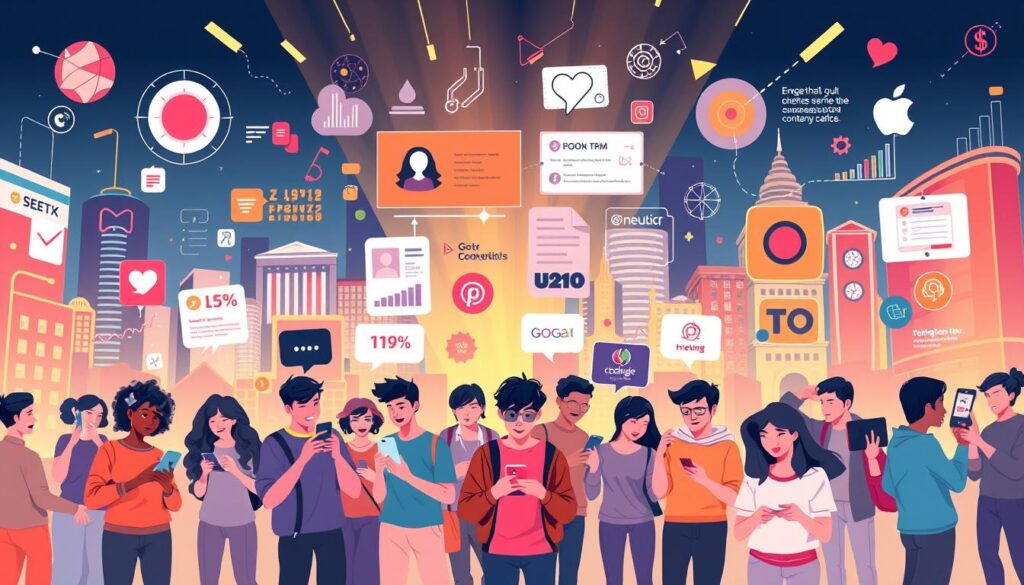Network agencies are big players in advertising and marketing. They work across many countries and markets. These large groups are great at handling big campaigns and keeping brands consistent worldwide.
They were made to help international clients. This makes it easier to create and adapt ads in different places.
These agencies have lots of resources. They offer training and help their staff grow. With their global reach and services, they can handle big marketing projects. They make sure the brand message is the same everywhere.
Key Takeaways
- Network agencies are global advertising and marketing powerhouses with a worldwide presence.
- They offer seamless integration of services across multiple countries and markets.
- Network agencies excel at managing multinational campaigns and providing consistent branding for global brands.
- They have access to extensive resources and can provide structured training and development opportunities for employees.
- Network agencies are well-equipped to oversee complex, cross-border marketing initiatives and ensure consistent brand messaging worldwide.
What Is a Network Agency?
Network agencies are known for their global reach and ability to handle big campaigns. They cater to clients who operate worldwide. This is thanks to pioneers like David Ogilvy, who expanded his agency to Germany at a client’s request.
These large networks offer a wide range of services. They have more resources than smaller agencies. This makes them a key part of the industry.
Core Characteristics of Network Agencies
Network agencies stand out for several reasons. They have:
- A global presence, with offices in many countries
- Services that cover everything from creative work to media planning
- Standardised processes for consistent campaign execution
Historical Development of Agency Networks
The growth of network agencies is linked to the globalisation of marketing and advertising. As brands grew internationally, they needed agencies that could handle global campaigns. This need led to the rise of large, multinational networks.
Key Players in the Network Agency Landscape
Leading players in the network agency world include WPP Group, Publicis Groupe, and Omnicom Group. These agencies have big budgets and handle important projects. Their size lets them offer a wide range of services to clients.
The Global Structure of Network Agencies
Worldwide marketing agencies and global marketing organisations have a big presence in many places. They use a global network to offer unified services and run campaigns smoothly everywhere. But, the need for local solutions has made the old model less effective, showing the importance of finding a balance.
Many network agencies have set up branches and affiliates in different countries. This lets them help international clients while keeping a local touch. Their global reach gives them access to a wide range of talents and resources. This helps them manage big, international branding campaigns.
| Characteristics | Global Network Agencies | Independent Agencies |
|---|---|---|
| Geographical Presence | Extensive global network with offices and affiliates worldwide | Typically focused on local or regional markets |
| Resources and Expertise | Access to a vast array of resources, talent, and multi-disciplinary capabilities | Agile and adaptable, with specialised expertise in their local markets |
| Client Relationships | Long-standing relationships with major multinational brands and corporations | Tend to have more personal, strategic partnerships with clients |
| Fee Structures | Generally higher fees due to their extensive global infrastructure | Typically offer more competitive pricing due to lower overhead costs |
This article shows the ongoing debate in the industry about the best ways to do global marketing. It’s about finding a balance between cultural understanding, strategic insight, and being efficient. Global network agencies have a lot to offer, but independent agencies are quick and personal. They offer a different view on the future of marketing worldwide.
Benefits of Working with Network Agencies
Network agencies bring many benefits to businesses looking for marketing help. They offer access to a wide range of skills and knowledge from around the world. This means clients can get expert advice and services no matter where they are.
These agencies have teams in many places, making sure services are the same everywhere. This consistency helps businesses keep their brand strong and clear, no matter where they operate.
Access to Global Resources
Working with a network agency means tapping into their global network. They have teams in many countries, offering a variety of skills and local knowledge. This helps clients run their marketing campaigns smoothly in different places.
It ensures that their brand is managed well everywhere. This makes it easier for businesses to reach their customers all over the world.
Integrated Service Offerings
Network agencies offer a wide range of marketing services all in one place. They handle everything from creative work to digital ads and PR. This makes it easier for clients to manage their marketing efforts.
Instead of working with many agencies, clients can deal with just one. This saves time and makes things simpler.
Standardised Processes Worldwide
Network agencies use the same processes everywhere they work. This means clients get the same quality of service, no matter where they are. It also makes things more predictable and reliable.
These standardised processes help the agencies work more efficiently. This can lead to cost savings and better use of resources for clients.
Even though the internet has changed things, network agencies still offer big advantages. They have a global reach, provide a wide range of services, and help manage brands consistently.
| Advantages of Network Agencies | How Network Agencies Work | Integrated Marketing Services |
|---|---|---|
|
|
|
Network Agencies vs Independent Agencies
Choosing between network and independent agencies depends on personal taste and needs. Network agencies offer a structured setting and chances for career growth. Independent agencies, on the other hand, provide flexibility and close ties with top leaders.
Recent data shows a clear divide. In London, 43% of full-time roles were in independent agencies, and 57% were in networked agencies. This highlights a big difference between the two types of agencies in the digital and creative sectors.
| Key Factors | Network Agencies | Independent Agencies |
|---|---|---|
| Resources and Opportunities | Access to bigger resources, structured training, and development opportunities, as well as industry awards and recognition. | Offer a more flexible working environment, exposure to complex tasks early in one’s career, and a focus on learning through experience. |
| Client Relationships | Brands are increasingly consolidating their budgets within a particular network, which can lead to long-term partnerships. | Offer more personalised attention from senior executives and experienced professionals, resulting in higher client satisfaction. |
| Pricing and Specialisation | May have higher overhead costs associated with their size and corporate structure. | Tend to be more cost-effective, offering competitive pricing without the overhead costs of larger network agencies. They often specialise in specific niches or industries, providing deep expertise and tailored solutions. |
| Adaptability and Transparency | May struggle with rapid adjustments due to their size and corporate structure, and may have slower decision-making processes. | Offer greater flexibility and agility, allowing them to quickly adapt to changing market conditions and client needs. They also tend to have more transparent operations, pricing, and reporting, fostering trust and accountability with clients. |
Network agencies have more resources and structured chances for growth. But, independent agencies are known for their flexibility, deep industry knowledge, and personal service. The right choice depends on what the client needs and prefers.
Cost Considerations and Pricing Models
Working with network agencies for global campaign management can be more expensive than independent agencies. This is because network agencies have to pay for things like membership fees and industry events. Some people wonder if the extra cost means better service or results.
Fee Structures and Billing Methods
Network agencies use different ways to charge their clients. For example, they might ask for 25% to 50% of the total cost upfront. The rest is due when the project is finished. They also charge by the hour or based on how well they do.
Value Proposition Analysis
When thinking about working with a network agency, clients need to look at the return on investment (ROI). A study by McKinsey and Company found that a 1% price drop can lead to an 11.1% profit increase. This shows why it’s key to check if the higher costs are worth it for the quality and results.
ROI Considerations
Choosing between a network agency and an independent one should be based on ROI. Consider the agency’s global reach, the services they offer, and their processes worldwide. By looking at ROI, clients can decide what’s best for their budget and goals.
| Pricing Model | Description | Suitable For |
|---|---|---|
| Retainer-based | Provides steady income and long-term planning options | Ongoing services like social media management |
| Performance-based | Aligns agency compensation with results achieved | Services with easily measurable results like PPC advertising |
| Fixed fee | Charges a predetermined amount for the project | Projects with clear deliverables and timelines |
The pricing model used by network agencies affects the cost and value for clients. Knowing the different models and what they’re good for helps clients choose the right partner for global campaign management.
Managing Global Campaigns Through Network Agencies
Network agencies are great at handling global campaigns. They have a big presence worldwide and follow the same steps everywhere. This makes it easier for clients to manage their marketing in many countries at once. But, some worry that these campaigns might not hit the mark in each local market.
Network agencies bring many benefits to global campaigns. They offer access to worldwide resources like talent, tools, and data. This helps create a consistent brand image everywhere. They also handle all parts of a campaign, from planning to execution, making things easier for clients.
Also, network agencies have the same processes everywhere. This makes managing campaigns more efficient and can save clients money. It also means they get a better return on their investment.
| Benefit | Description |
|---|---|
| Access to Global Resources | Network agencies provide clients with access to a vast pool of talent, tools, and data, enabling a more cohesive and consistent brand experience across markets. |
| Integrated Service Offerings | Network agencies offer a wide range of services, from strategy and creative to media planning and execution, under one roof, streamlining the global campaign management process. |
| Standardised Processes Worldwide | Network agencies have established standardised processes globally, ensuring efficient and cost-effective campaign management for clients. |
But, using network agencies for global campaigns has its downsides. The centralised approach might miss the unique needs of each market. Clients need to think carefully about whether the benefits of a network agency outweigh the need for localised strategies.
In conclusion, network agencies can be a big help in managing global campaigns. But, brands must consider the pros and cons to make sure their marketing works well everywhere. By using network agencies’ global reach while keeping an eye on local needs, brands can succeed in international advertising.
The Role of Network Agencies in International Branding
Network agencies are key in helping brands go global. They use their knowledge of different cultures to make sure the brand looks the same everywhere. This means they adapt the brand’s message to fit local tastes while keeping its core values.
Cross-Cultural Marketing Expertise
These agencies really get how different cultures work. They use this knowledge to create ads that speak to people in each place. This way, they make sure the brand’s message is clear and strong, avoiding any mistakes.
Brand Consistency Across Markets
Keeping a brand’s image the same everywhere is hard. Network agencies help a lot with this. They use their wide knowledge and services to make sure the brand looks good everywhere.
But, there’s a growing need for marketing that really understands local tastes. This has made some brands question the old ways of network agencies. They want to find a balance between being global and being local.
“Network agencies are invaluable partners in navigating the complexities of international branding. Their cross-cultural expertise and ability to maintain brand consistency across markets make them indispensable for global organisations seeking to establish a strong, unified presence worldwide.”
The world of international branding is always changing. Network agencies keep playing a big part. They help brands reach out to people all over, using their global reach and services.
Challenges and Limitations of Network Agencies
Network agencies bring many benefits but face big challenges too. One major issue is their perceived lack of agility. Large networks’ slow response to market changes or client needs is a big problem.
They also deal with conflicts of interest. Trying to balance global strategies with local needs can cause problems. This might make it hard for them to meet the unique needs of clients or markets.
- Perceived lack of agility due to corporate structures and policies
- Potential conflicts of interest in balancing global and local market needs
- Difficulties in talent retention and motivation within the network
- Diminished exclusivity of marketing knowledge in the digital age
Keeping talent motivated is another challenge. The big, structured world of network agencies isn’t always appealing to creative minds. The internet has also changed things, making marketing knowledge more accessible. This makes it tough for network agencies to stand out.
“The key challenge for network agencies is to strike the right balance between global consistency and local responsiveness, while also fostering a culture that attracts and retains top talent.”
To beat these hurdles, network agencies need to keep changing. They must stay agile, innovative, and appealing to clients and staff. By tackling these issues, they can grow stronger in the marketing world and offer more value to their clients.
Top Global Network Agencies and Their Specialities
In the fast-paced world of advertising and marketing, a few global network agencies lead the way. WPP Group, Publicis Groupe, and Omnicom Group are among the top. Each offers unique skills and services to clients all over the world.
WPP Group Overview
WPP plc is the biggest advertising agency group globally. It has a strong presence in communications, experience, commerce, and technology. With over 130,000 employees and revenues near £19 billion, WPP’s network offers a wide range of services. This includes traditional and digital solutions.
Publicis Groupe Services
Publicis Groupe was founded in 1926. It’s a major player in the industry, with Q2 2024 revenue of £3.74 billion. The group covers digital and traditional ads, media planning, and public relations. It’s a complete solution for clients’ marketing and communications needs.
Omnicom Group Capabilities
Omnicom Group has over 77,000 employees and Q2 2024 revenue of £3.85 billion. It’s known for its creativity and global reach. As a parent to over 1,500 agencies, Omnicom offers a wide range of services. This includes strategic planning and innovative campaigns for best network agencies and top global advertising agencies.
| Agency Group | Q2 2024 Revenue | Employees | Key Specialities |
|---|---|---|---|
| WPP Group | £3.51 billion | Over 130,000 | Communications, experience, commerce, technology |
| Publicis Groupe | £3.74 billion | Approximately 75,000 | Digital and traditional advertising, media planning and buying, public relations |
| Omnicom Group | £3.85 billion | Over 77,000 | Strategic planning, innovative campaigns, creative capabilities |
| Interpublic Group | £2.67 billion | Around 55,000 | Media and marketing specialists across 130+ countries |
| Dentsu | £1.838 billion | More than 62,000 | Creative/advertising, SEO/SEM, digital, event and sponsorship marketing |
| Havas | £1.189 billion | N/A | Digital advertising, media planning, public relations, corporate communications |
| Stagwell | £670 million | N/A | Digital-first global marketing network with a unique combination of creativity and technology |
These top global advertising agencies keep up with the changing marketing world. They stay ahead in innovation and client satisfaction.
Conclusion
The role of network agencies in marketing is changing. They have the advantage of global reach and integrated services. But, they face challenges from agile independent agencies and changing client needs.
Their success will depend on blending global reach with local expertise. They must also adapt quickly to market changes. And, they need to offer innovative, cost-effective solutions to clients.
As the future of network agencies evolves, their evolving role in global marketing networks will be key. They must stay ahead by anticipating client demands and technological changes. This will help them keep their competitive edge.
Successful network agencies will integrate their worldwide resources well. They must deliver services that meet the unique needs of local markets. This way, they can stay relevant and valuable to their clients.
In the end, network agencies’ continued relevance will depend on their ability to evolve and innovate. By embracing agility, technology, and understanding diverse markets, they can remain crucial partners in global marketing and communications.










